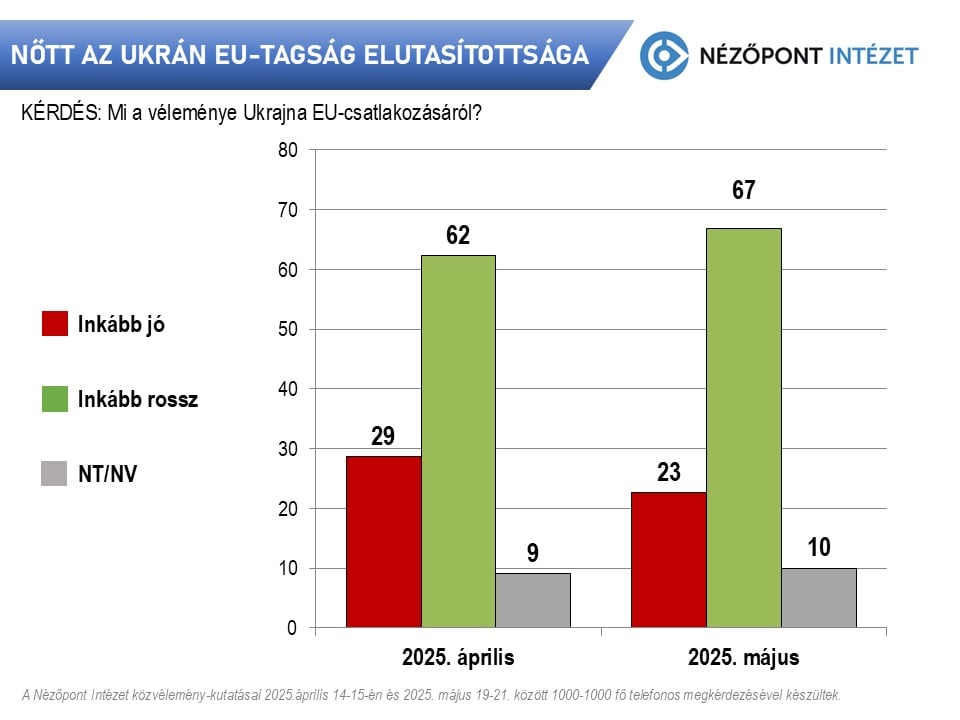
Hungarians increasingly reject Ukraine’s EU membership, with is a significant shift in sentiment ahead of a 2025 referendum.Continue reading

At a press conference held prior to a forum organized as part of the Fidesz party’s nationwide tour, MEP Csaba Dömötör stated that a full-scale campaign had been launched in Brussels for Ukraine’s accelerated membership.
The politician underlined that this potential enlargement, under current circumstances, would “ruin the already bleeding European economy.”
They are using every means at their disposal to break the resistance, including rule-of-law proceedings, blackmailing with voting rights, restricting energy supplies, and now even secret service tools, in which certain Hungarian opposition figures are also involved,”
noted Dömötör, suggesting the potential role of the Hungarian opposition party Tisza in the accelerated accession of Ukraine.
The representative of Fidesz believes Brussels is treating it as an accomplished fact that all accession chapters will be opened this year and that Ukraine will be granted full membership before 2030. He added that this is a complete reversal of all previous procedures, not a process based on merit and the fulfillment of clear conditions, but “an order that, according to the Brussels elite, can only be accepted.”
They are unwilling to clarify even the most fundamental issues, and the European Union’s budget would have to be restructured for enlargement due to the economic consequences.”
“As a result, cohesion funds could be reduced, according to some analyses by as much as 15-25 percent in Hungary’s case. Agricultural subsidies could fall by 20 percent, with some markets, such as agricultural markets, being opened up even before full membership, but we have seen clearly what the consequences of this could be, with Hungarian farmers suffering enormous losses in recent years,” said Dömötör.
The MEP also pointed out that Europe has spent a total of EUR 141.86 billion (57 trillion HUF) on the war so far, and according to some estimates, the cost of war reconstruction could be even higher, reaching EUR 448.58 billion (181 trillion HUF).
Based on current experience, a significant portion of the required support would need to be provided by Europe before, or even irrespective of, full membership. In recent weeks, calls have intensified to restrict energy imports from Russia, which could lead to even steeper energy price hikes on top of those already experienced. The politician also highlighted the undignified debate on whether the membership process should be accelerated. In this context, he cited remarks from key European leaders, including Ursula von der Leyen, President of the European Commission, Roberta Metsola, President of the European Parliament, and António Costa, President of the European Council, all of whom have expressed a clear intention to expedite the process. Similar statements have been made by Kaja Kallas, High Representative for Foreign Affairs and Security Policy, Marta Kos, Commissioner for Enlargement, and Manfred Weber, President of the European People’s Party, who emphasized that support for Ukraine must remain “unconditional.”
Dömötör pointed out that this is the process, the European Union’s accelerated push for Ukraine’s membership, that the Tisza Party is trying to deny with all its power. It is no use, because after collecting signatures, they now have “a stamped piece of paper saying that they are joining the queue and they also want Ukrainian membership. The Brussels elite has therefore launched a total campaign for Ukrainian membership, as if Europe did not already have enough crises to deal with, as if there were no other problems to solve.”
“We also have a powerful tool, the will of the voters, which is why it is important that more than 1.2 million people have already expressed their opinion,” the MEP concluded.
Via MTI; Featured photo: MTI/Katona Tibor